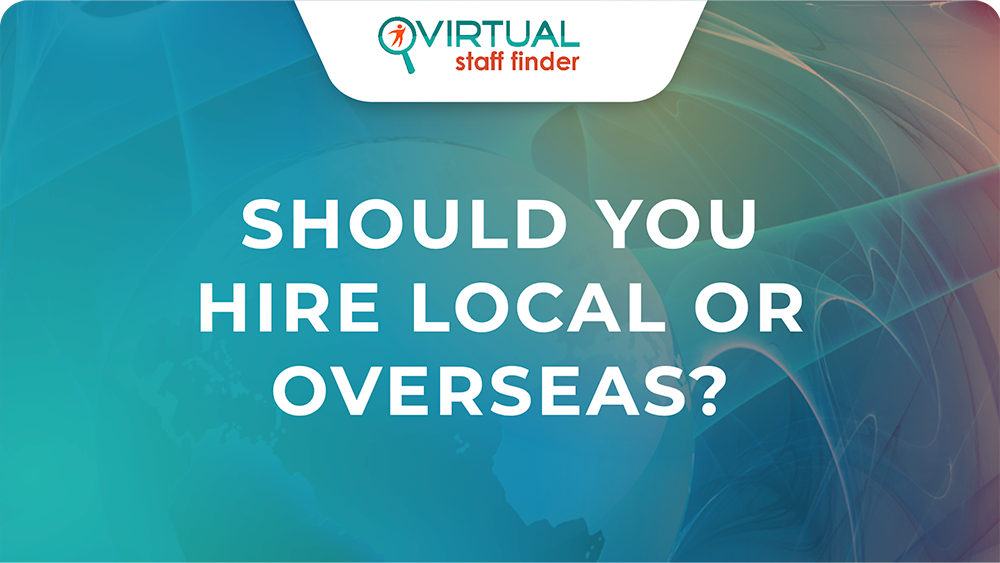One of the biggest questions in the world of virtual staffing is whether you should recruit locally or overseas.
For those of you who don’t know me well, here’s a quick bio. A while back, I was speaking at a conference in the United States in front of around 400 small business owners. At the end of my presentation, we had time for some questions. One gentleman took the microphone and asked how I felt about promoting the idea of taking jobs away from his country.
I pointed out that rather than taking anything away from anyone, a small business can survive its startup phase and eventually create more opportunities for local expansion by enlisting the talents of overseas employees in the beginning.
Though I’m sure the attendee wasn’t looking for a fight—nor did I take his line of questioning that way—he did bring up a point that often concerns a lot of people. Both local and offshore talent can effectively deliver the services you need to run, support, and grow your business, no matter where in the world it’s based. But there are pros and cons to both types of workers.
The practice of outsourcing overseas is nothing new. But don’t confuse building a team of virtual workers with operating an overcrowded call center or some dingy overseas sweatshop.
The global workforce is expanding faster than we can keep up with it—and sometimes it makes sense to hire overseas workers because of their skill sets and experience rather than their lower hourly rates. That said, sometimes it’s prudent to keep things a little closer to home when the time is right or when the task calls for it.
The Advantages of Staying Closer to Home
Remember when you went to college or moved into your own place for the first time and left behind the family home where you grew up? I don’t know about you, but I used to go back to that family home each week—sometimes more—for my mother’s home-cooked meals.
I also used to go back to talk to my father about business and life. He wasn’t a rich man and he didn’t have a lot of worldly experience, but he was hardworking and loyal to his employers—and he instilled those qualities in me as a young professional.
Why is it that we prefer to stay close to home when we first go out on our own? In many cases, it’s for a sense of comfort and knowing we can depend on those who are closest to us. There’s something reassuring in staying close to people who know us, understand our personalities, relate to the ways we communicate, and share a common worldview.
Here’s the thing: a lot of people think that in order to take full advantage of outsourcing, they need to have a small army of VAs in a foreign land—but this isn’t the case. Sometimes your business is better served by finding local talent instead of venturing overseas.
Here are a few examples of the benefits of working with a local VA:
- You work in the same time zone. It may be advantageous to have the same work schedule as your VA so that you can answer questions and/or so that he or she can serve your clients in real-time.
- You need a skilled writer. Think of your target market or audience for a moment. Would you rather have a foreigner addressing your customers in writing or someone local who understands your cultural mindset and business needs and is also a native speaker of the language? If you’re looking for a copywriter or content writer, I recommend finding someone local. When you need someone to capture your “voice,” it makes no sense to venture overseas.
- You might already like the VA’s work. When you like someone’s work, price and location are no longer relevant. Even though I run a VA company and have access to hundreds of employees, I myself will often outsource outside of my own roster of VAs (usually for project-based work) when I like someone’s style, background, or simply the way he or she works.
- The local VA just gets it. Many business owners I’ve spoken with say that they prefer to work with domestic VAs simply because they are local. The VAs have the same traditions as their employers and have a better understanding of customers in the country in which the company is based.
Figuring Out When You Should Stay Closer to Home
Here’s a perfect example of when it’s best to stay close to home: One of our clients, a cosmetic surgeon, was working with an SEO VA to optimize his website. The VA had helped the client to rank very well in search engine results—and after some time, our client started getting requests for guest posts from other sites within his niche.
He was interested in writing guest posts because they would increase brand awareness for his clinic—it was essentially free, highly targeted advertising—but he was receiving so many requests that he couldn’t keep up. He approached us and asked for a ghostwriter. The client’s plan was to focus on finding sites for which he could write guest posts and then have a Filipino VA write the articles. By passing off the writing to a VA, he figured he could take on a large number of guest posts without burning out.
In essence, this isn’t a bad strategy. However, hiring an overseas VA wasn’t the answer for this client; he needed to write these articles himself or find someone locally to ghostwrite for him. Since the articles would be targeted to an affluent demographic, they needed to be written by someone who could truly understand the mentality of the market. And because they were intended to persuade readers to choose the client’s service, the articles needed to sound as though they had been written by someone with experience in the field.
It’s important to understand how an overseas VA’s culture and experience will affect the work he or she produces. It’s not that an overseas VA is incapable or uneducated or won’t work hard, but most virtual workers don’t think like entrepreneurs—they think like employees. That means you cannot expect them to communicate with the same levels of salesmanship and persuasion that you might be used to.


